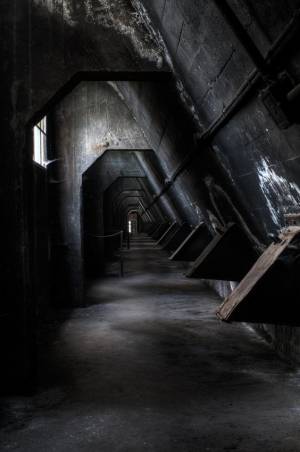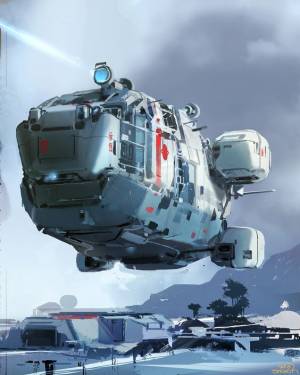Introduction
When and Where
Style and Tone
Conduct and Themes
FAQs
User Tools
Sidebar
Table of Contents
Redemption Reform Facility
“Due to its acceptable atmospheric conditions and solar system positioning, b-Exagora has been earmarked for future colonisation[33][34]. As is industry standard[7], this requires a minimum of a century of terraforming using the most economically-favourable development techniques. The site is remote and therefore security can be guaranteed, but it remains easily servicable by an extant ten-monthly interplanetary supply shuttle with only minor modifications to the existing route[Appendix 3b]. Elements of the terraforming require either sophisticated machinery or hard human labour, and non-exposure to hazards including radiation[35] and natural disaster cannot be guaranteed. Security would be innately guaranteed without further investment for a penal facility: due to inhospitable terrain, absconsion attempts would rapidly result in expiration. Therefore we propose that b-Exagora, like many other planets undergoing terraforming, is an ideal site for a penal colony.”
—Excerpt from the conclusion of the Exagora Development Committee's “Future Directions 623PE” report.
b-Exagora
Redemption Reform Facility was built twenty-five years ago to house 1500 inmates serving their sentences by hard labour. It is situated on b-Exagora to facilitate the terraforming process.
The terraforming has been in development for two decades now, but underfunding and lack of technological expertise has hampered results. The atmosphere is now breathable; oxygen concentrations are maintained by Pro² Atmo1-4™ oxygenation machines at the same concentration as the atmosphere of Elysium. No non-human lifeforms have been implanted, but the water cycle is functional and recognisably-habitable geographical formations are present. This means that although there is no topsoil or independent oxygen-producing systems, there are rivers, seas, and an important absence of supervolcanoes. Gravity is slightly less than that of Elysium.
Less than 0.0001% of the planet surface is inhabited. Apart from the prison complex, there are a few scientific facilities and data stations. All necessities of survival are deposited by the supply ships.
Off-Planet Contact
Redemption Reform Facility is a stop on the supply ship run between several systems with mining outposts and other terraforming stations. Due to the travel time, inmates are those who have been handed longer sentences1). The sentences are necessarily in denominations of years. The journey from civilisation consists of at least 3 years on the supply ships. There is no resident means of interplanetary transport on b-Exagora. Those wishing to terminate their employment and those who have served their sentence must wait for the next supply ship to leave.
Interplanetary Communications
b-Exagora receives the full service of interplanetary broadcasts.
Inmates have restricted access to external media and all access is timed and monitored. Communications outside of the prison can be earned by the inmates as rewards for good behaviour, but any such communication is monitored by the guards.
Prison Conditions
Although Redemption Reform Facility was built to house 1500 inmates plus 300 guards, the current prison population runs closer to 3000. The expansion of habitable planet surface has led to further accommodation, but due to upkeep costs of the scientific stations, other prison services have not been improved proportionately. Lack of funding for new accommodation blocks has resulted in overcrowding. For the guards—whose numbers have not increased—the reduced enforcer:prisoner ratio is a continual source of stress, which has caused some guards to show greater authoritarian tendencies.
The prison complex follows a basic layout. There are the main cell blocks, Alpha, Bravo and Charlie; the basic facilities (see below) and auxiliary infrastructure buildings such as the water filtration systems and the lifter and buzzer landing pads (see below).
Inmates have freedom of movement around the main prison, although the warehouses and depots require the correct clearance level on your keycard. Inmates are assigned cooking and cleaning duties: there are no paid staff members to manage domestic affairs. However, the prison meets all basic requirements for healthy living. The food, preserved and bland as it is, provides all essential nutrients and appropriate sustenance. The water is safely potable, the heating adequate, and no diseases of poor hygiene or water safety are present on b-Exagora. Colonists are screened for communicable disease before entry.
There is a separate complex for the prison guards, with an enforced perimeter. This is off-limits to all inmates. The layout and contents of the interior are not generally known.
Prisoners are permitted to wear clothes either brought with them or made from the materials available in the prison, but if necessary they are issued with a standard outfit of a white t-shirt and plain trousers.
Inmate Demographics
Redemption Reform Facility accepts prisoners of all security risks. It is a mixed facility for criminals and prisoners of war. There is no distinction of accommodation or work assignment based on length of sentence or severity of crime. The majority of the inmates are members of one of the prison's several gangs (see the gang pages).
Many of the prisoners have cybernetics. Most of these are simple replacement limbs or organs, but some are sophisticated sensory devices or dangerous weapons. A controversial Elysian court judgement considers cybernetics a part of the person, and as such does not allow their removal even in the case of prisoners with cybernetic weapons.
Schedule
The day-night cycle of b-Exagora takes only 15.01 hours, too short for the inhabitants to comfortably follow, so the prison follows a 24-hour schedule, with work taking place at any time of day or night. The cold and dark of winter night shifts regularly causes some grumbling among the prisoners, but any who grumble too loud are likely to only be assigned more day shifts in summer, when the uncomfortable heat is just as bad.
Prisoners' work tasks in the Facility include domestic work, mechanical maintenance, operating terraforming machinery, building construction, driving to and from the scientific stations, occasionally helping the Facility staff with low-security tasks, and grunt work of data gathering and terrain surveillance. The guards have the power to reallocate prisoners to work groups at will.
Prison Security
Redemption Reform Facility has a full complement of reinforced walls, live surveillance, keycard access checks and biorecognition software for those areas of the prison with restricted access. A major component of security is the use of collars. Each inmate is fitted with an electronic collar2) upon disembarking at the Facility. These collars are not removed until a sentence is served and one has departed the Facility and is being released back into civilisation.
Made of light metal and silicon, the collars are generally dormant. However, all Facility staff can activate the collars' security functions with voice commands. The collars respond by temporarily muting, paralysing, or inflicting severe, but fleeting, neuropathic pain on its wearer (see Calls). They do not cause physical harm. The official purpose of the collars is strictly stipulated as the control of inmates when absolutely necessary and where other methods of de-escalation have failed. However, it has not been observed that the collars have any activation criteria other than an authorised voice speaking the command, or that they have a cool-down time. The collars appear to be fitted pre-programmed and have been seen to remain functional despite severe physical damage. How they work is not public knowledge, and any inmates found attempting to interfere with their operation will be subject to disciplinary measures.
Prison Facilities
The following facilities are present in the prison:
- An exercise complex, including various gym and sports equipment.
- A library, with a small number of books, mostly disintegrating and outdated.
- One kitchen and a communal dining hall for each cell block. Guards generally turn a blind eye to prisoners eating in the dining hall of a different block.
- Various communal spaces, both indoor halls and outdoor rock gardens, which are provided for prisoners to use during their relaxation shifts.
- Workshops, where prisoners may work on assigned projects under the tight supervision of guards. Personal project time may be allowed in exchange for good behaviour and even tighter supervision.
The following facilities are present in higher security areas of the prison, which prisoners will generally not be able to access without good reason:
- The vehicle hangar, containing all the transport used to get around the planet.
- Various warehouses where the equipment used by the prisoners for terraforming operations is stored.
- The medical bay, where the doctor and his staff treat any injured prisoners.
- The guard barracks and armoury.
Transport on b-Exagora
As part of the terraforming work, prisoners are often needed in locations remote from the prison itself. As such, the prison has a fleet of vehicles to move them around the planet. All vehicles are electric, and may be charged either from the prison power supply or by integrated solar panels.
 Crawlers are large, all-terrain transports, rated to hold 25 people and a buggy, but capable of holding more people if no-one cares about their comfort. They are capable of driving for up to two days on a full charge, but the solar panels would take almost a week of constant sunlight to fully charge them.
Crawlers are large, all-terrain transports, rated to hold 25 people and a buggy, but capable of holding more people if no-one cares about their comfort. They are capable of driving for up to two days on a full charge, but the solar panels would take almost a week of constant sunlight to fully charge them.
Buggies are small, fast, two-person vehicles, generally used by guards to patrol around large remote sites. They can drive for 5 hours on a full charge without further topping up, or indefinitely during daylight hours (with slightly reduced performance if the battery is depleted).
Lifters are huge, automated VTOL3) aircraft, able to carry up to 4 crawlers or equivalent cargo. Once in flight, they can theoretically stay in the air indefinitely, but due to the large power requirements for VTOL they are only able to take off 4 times between charges. The prison has two lifters, which are used when prisoners are required in regions a considerable distance from the prison itself.
Buzzers are smaller aircraft, holding up to 5 people, and are used mainly for transport between the prison and the other facilities on the planet. They can remain in the air indefinitely, or take off twice between charges.
Other Facilities on b-Exagora
As well as the prison, there are three main terraforming stations, which house scientists and engineers in relative comfort. Prisoners will occasionally be assigned tasks at these stations, but always under heavy guard. The current status of these stations is unknown to the prisoners.
Station Red is the hub of the b-Exagora terraforming effort. Located on the equator (about 1000km from the prison, a full day's travel by lifter or buzzer), it is the anchor point for the space elevator which leads off-planet. All off-planet communication is sent through this station.
Station Green is the biological research centre for the terraforming project. At the present stage of terraforming, Station Green is working to ensure compatibility of crops and oxygen-producing plantlife with b-Exagora. No planting has yet occurred, aside from the introduction of algae to the oceans. Station Green is located on the same continent as the prison, on the western shore (about 500km from the prison, a full day's drive by crawler or a few hours by lifter or buzzer).
Station Blue houses the heavy machinery used for the terraforming process. This includes the oxygenation and atmospheric modification machines which maintain breathable air, and colossal pumping stations which adjust the concentrations of the seawater. Station Blue is located towards the North Pole (about 5000km from the prison, several days by lifter or buzzer), in a location chosen to take advantage of several large ocean currents and jet streams, so that the modifications to the air and water are distributed around the planet.

